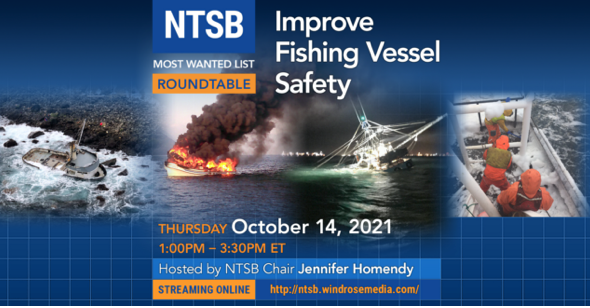The National Transportation Safety Board announced plans for an Oct. 14 virtual online roundtable meeting on ways to improve fishing vessel safety.
NTSB board chair Jennifer Homendy will host the session with government officials, fishing industry leaders and vessel operators, safety experts – and fishermen who have survived accidents.
The discussion will be a webcast from 1 p.m. to 3:30 pm Eastern time, and can be viewed online at http://ntsb.windrosemedia.com/
“The commercial fishing industry remains largely uninspected and is a marine sector of concern,” according to the NTSB announcement. “Approximately 58,000 U.S. commercial fishing vessels are in service today in the U.S. Fishing consistently tops the list of most deadly occupations, due, in large part, to challenging work environments, such as poor weather and rough waters.
“There have been more than 800 fatalities, 164 missing people, and 2,122 people injured in commercial fishing vessel accidents in the past two decades.”
That’s how long it’s been since the Coast Guard and NTSB made a big push for changes with the Commercial Fishing Vessel Safety Task Force, convened in 1999 after a disastrous series of accidents, including four East Coast clam boats that sank in a span of 13 days in January.
The task force final report led to reforms, including a new emphasis on aspects like stability testing and safety training for fishermen. But those stopped short of the mandatory inspection regimes that some safety advocates had called for.
About a decade later, the NTSB held a fishing vessel safety forum. “At that time, five safety recommendations were issued; three remain open today,” according to NTSB officials.
The NTSB has continued to push for improvements, and the agency’s annual “Most Wanted List of Transportation Safety Improvements” is again ranking fishing vessel safety near the top.
The new roundtable comes in the wake of major Coast Guard and NTSB reports on the sinkings of the Bering Sea crab vessels Destination, in February 2017 with the loss of six crew, and Scandies Rose on Dec. 31, 2019 when five of seven men were lost.
The marine boards of investigation convened for those cases looked critically at issues of stability, loading of crab traps and the danger posed by icing on the gear. Based on its Destination findings, the NTSB issued a safety alert on icing.







